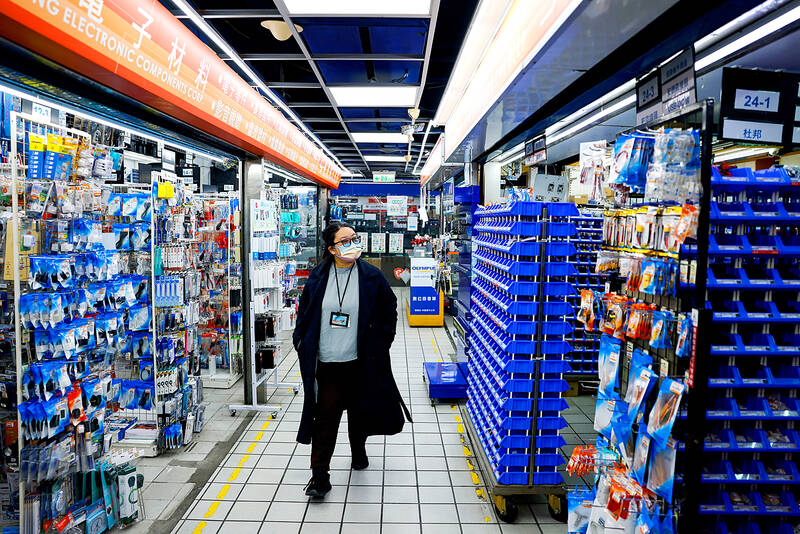With US President Donald Trump’s new tariffs set to take effect in the coming days, academics yesterday said the move aims to pressure countries into negotiations to reduce trade deficits, while security ties with allies would remain unaffected.
Trump on Wednesday announced sweeping “reciprocal tariffs” on dozens of countries, including Taiwan, whose exports to the US are to face an import duty of 32 percent.
National Taiwan University Department of Political Science associate professor Chen Shih-min (陳世民) said that the tariffs were not the main focus, but rather a tool to pressure other countries into negotiations.

Photo: Ann Wang, Reuters
Trump’s primary goal is to reduce the US trade deficit, as reflected in the formula used to calculate the upcoming tariffs, which divided the US goods trade deficit with a country by that country’s exports to the US, converting the result into a percentage, and then halving it, Chen said.
Taiwan’s trade surplus with the US stood at just more than US$20 billion during Trump’s first term, but had grown to more than US$70 billion last year, he said.
Such growth was largely driven by the rise of artificial intelligence and the surge in semiconductor exports from companies such as Taiwan Semiconductor Manufacturing Co, he added.
“For Taiwan, the problem is not difficult to solve,” he said, adding that to reduce its trade surplus with the US, Taiwan could increase its procurement of US goods.
Chen cited as an example was CPC Corp’s recent signing of a letter of intent for trade and investment with Alaska last week for liquid natural gas and agreeing to purchase gas.
Taiwan lacks domestic energy resources such as natural gas and oil, and shifting energy purchases from the Middle East or Africa to the US could help reduce the trade surplus, he said.
National Sun Yat-sen University Institute of China and Asia-Pacific Studies chair Kuo Yu-jen (郭育仁) said that countries such as Taiwan, Japan and South Korea were likely to pursue negotiations with the US and adjust their trade models accordingly.
Such approaches would differ from that of China, which is to take countermeasures by imposing broad-based tariffs on US goods, and the EU, which might respond more mildly by targeting specific products with symbolic tariffs, Kuo said.
As for the impact on the US’ security ties with its allies, Kuo said they would remain unaffected.
Unlike Trump’s decision to withdraw the US from multilateral organizations such as the WHO, he is now maintaining the “minilateral” security frameworks established during former US president Joe Biden’s tenure, Kuo said, citing the AUKUS (Australia-UK-US) security partnership as an example.
The US, Japan and South Korea had just conducted a joint naval exercise last week near South Korea’s Jeju Island, with the “Balikatan” joint military exercises between the US and the Philippines set to take place later this month, Kuo said.

The manufacture of the remaining 28 M1A2T Abrams tanks Taiwan purchased from the US has recently been completed, and they are expected to be delivered within the next one to two months, a source said yesterday. The Ministry of National Defense is arranging cargo ships to transport the tanks to Taiwan as soon as possible, said the source, who is familiar with the matter. The estimated arrival time ranges from late this month to early next month, the source said. The 28 Abrams tanks make up the third and final batch of a total of 108 tanks, valued at about NT$40.5 billion

Two Taiwanese prosecutors were questioned by Chinese security personnel at their hotel during a trip to China’s Henan Province this month, the Mainland Affairs Council (MAC) said yesterday. The officers had personal information on the prosecutors, including “when they were assigned to their posts, their work locations and job titles,” MAC Deputy Minister and spokesman Liang Wen-chieh (梁文傑) said. On top of asking about their agencies and positions, the officers also questioned the prosecutors about the Cross-Strait Joint Crime-Fighting and Judicial Mutual Assistance Agreement, a pact that serves as the framework for Taiwan-China cooperation on combating crime and providing judicial assistance, Liang

A group from the Taiwanese Designers in Australia association yesterday represented Taiwan at the Midsumma Pride March in Melbourne. The march, held in the St. Kilda suburb, is the city’s largest LGBTQIA+ parade and the flagship event of the annual Midsumma Festival. It attracted more than 45,000 spectators who supported the 400 groups and 10,000 marchers that participated this year, the association said. Taiwanese Designers said they organized a team to march for Taiwan this year, joining politicians, government agencies, professionals and community organizations in showing support for LGBTQIA+ people and diverse communities. As the first country in Asia to legalize same-sex

MOTIVES QUESTIONED The PLA considers Xi’s policies toward Taiwan to be driven by personal considerations rather than military assessment, the Epoch Times reports Chinese President Xi Jinping’s (習近平) latest purge of the Chinese People’s Liberation Army (PLA) leadership might have been prompted by the military’s opposition to plans of invading Taiwan, the Epoch Times said. The Chinese military opposes waging war against Taiwan by a large consensus, putting it at odds with Xi’s vision, the Falun Gong-affiliated daily said in a report on Thursday, citing anonymous sources with insight into the PLA’s inner workings. The opposition is not the opinion of a few generals, but a widely shared view among the PLA cadre, the Epoch Times cited them as saying. “Chinese forces know full well that